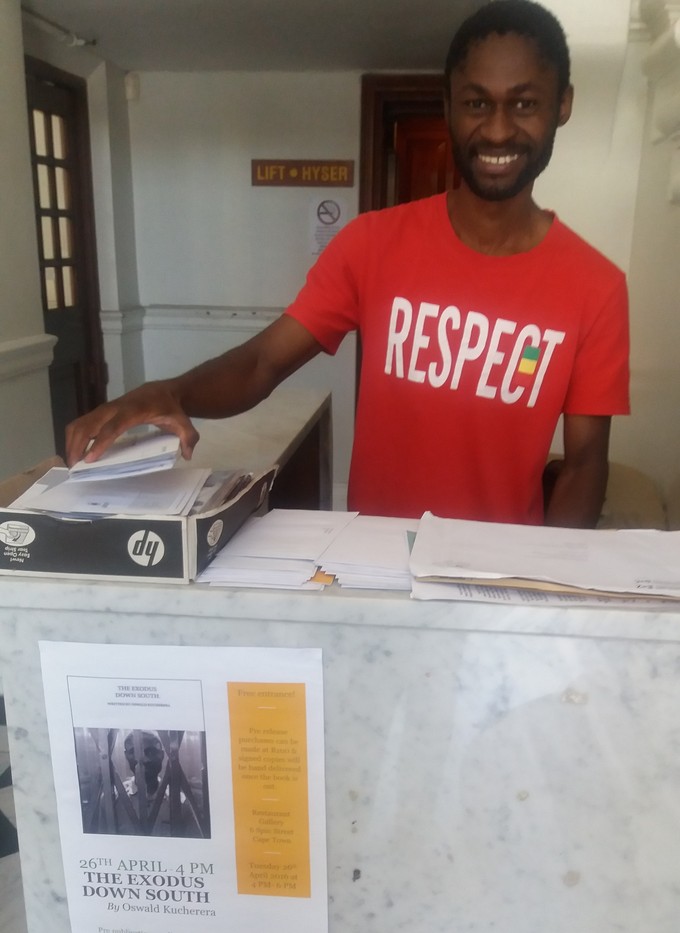Zimbabwean receptionist publishes his first book
Oswald Kucherera tells the story of his travails from Harare to Cape Town
Oswald Kucherera, a lift controller and receptionist, launched his first book The Exodus Down South on Tuesday. The launch took place in the Restaurant Gallery on 6 Spin Street, the old IDASA building, where he works.
Kucherera (30) was born in Masvingo province near Great Zimbabwe and completed high school at Pamushana Mission. He is the second in the family of four. He is an activist, human rights peer educator and writes about social justice issues for a woman’s magazine.
Kucherera is a dedicated employee. When I interviewed on Monday he took time to leave the interview and attend to guests entering the building. I had to be patient and interviewed during short breaks while he was doing his work.
Kucherera started writing in 2013. He used to share his writing and storytelling experience with children and youth of the Harare Academy of Inspiration in Khayelitsha. His second launch will therefore take place in Khayelitsha in May.
Book review
In her review of the book poet Nina Callaghan wrote, “The Exodus Down South wrestles with the horror and triumph of life as a migrant. Kucherera manages to capture the promise and brutality of hope. What it means to have it, to hold on to it, to lose it and build it all up again from not a shred of evidence that hope ever translates into a life yearned for.
“Kucherera writes candidly about his own journey from Zimbabwe to South Africa. His flight from a certain untenable future to an uncertain one. We travel with him as he creates his fate through every high stakes choice, every alliance and loss. His journey is rich with stories that each have their own inner life and that together, express the bigger narrative of displacement, community and forging a home. He does this through fleshed out characters we all can recognise. We pass them on the streets every day.”
The book cover shows the picture of Kucherera trapped in a lift. He says the bars represent his daily struggles as an immigrant.
Not ‘cool’ being called ‘kwere kwere’ by children
In 2009 after he was retrenched at the bank he worked at in Harare, Zimbabwe. He could not find another job, so he joined the exodus to South Africa.
It was not easy for Kucherera to establish a home here after uprooting himself. He found it difficult to integrate with other immigrants and South Africans.
“Staying in an area like Khayelitsha is hard if you are an immigrant … When I arrived I was stabbed and robbed. The community members did not feel sorry at all. My presence threatened them. They accused me of taking their jobs and called me names.”
“It is not cool to be called names but [hearing it from] children is worse. How can a child call me ‘kwere kwere’? I also do not like the way they call Somali owners ‘my friend’. Surely they lack respect to black foreigners because they do not call their elders my friend. I know Somalis are not happy with that but they just accept the term because of the nature of their business.”
Pointing to his T-shirt written respect at the front, he said, “This is why I am always wearing this T-shirt. I hope people in my neighbourhood will learn to respect immigrants.”
Kucherera said he highlighted the documentation problems of immigrants in his book because he struggled to apply for an asylum in Musina.
“It was important that I get asylum paper because Home Affairs was deporting undocumented people. Employers were paying as little as R50 [per day] if you did not have papers. Or you could not get hired at all,” he explained.
It was winter. For three days he braved rain and cold and slept on the street. He stayed outside the Musina Refugee Reception Centre. A pitched tent that available was small too accommodate all of the refugees. The area was also not safe.
The lift and reception that Kucherera manages faces the art gallery. He said working in a place where events like talks, book launches and art is displayed in the gallery all the time inspired him to start writing.
“I developed an eye and understanding of good art. Every month we have new artists displaying their work in the gallery. Though I cannot afford to purchase their art, I admire it. The environment motivates me. Cape Town as a whole has got many platforms for artists to show their work.”
He says his future plans include turning his book into a documentary and helping other upcoming writers publish their untold stories. He would also like to establish a resource centre to help children develop a culture of writing and reading.
The book is available for purchase for R100 at 6 Spin Street.
Support independent journalism
Donate using Payfast

Don't miss out on the latest news
We respect your privacy, and promise we won't spam you.
© 2016 GroundUp. 
This article is licensed under a Creative Commons Attribution-NoDerivatives 4.0 International License.
You may republish this article, so long as you credit the authors and GroundUp, and do not change the text. Please include a link back to the original article.

